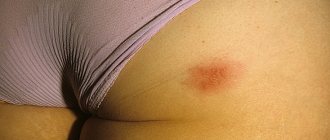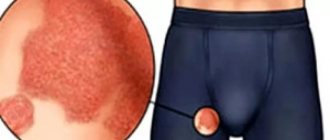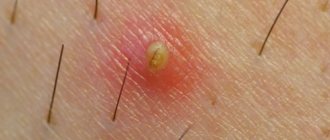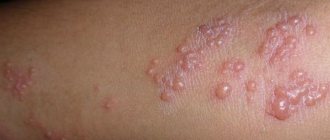The cure for herpes in intimate places is of interest to many. However, to date, pharmacists have not developed a drug that can completely get rid of the virus. According to WHO, herpes simplex virus (HSV) is the second most common disease after influenza. Moreover, about 90% of the population of modern megacities in all countries of the world is infected, although relapses are observed in only 5-12%.
Every year the numbers continue to grow. This is especially true for such a variety as genital herpes (that is, the one that occurs in intimate places). Over the past decade, the number of detected cases has increased by 160%, and the upward trend continues. Therefore, finding an effective drug is a critical issue.
Course of herpes
When infected with herpes, a rash appears in the intimate area.
Symptoms last about 2-3 weeks.
Then they regress.
For many people, herpes infection becomes recurrent.
The appearance of herpes in the intimate area occurs with a certain frequency.
When infected, HSV invades the skin or mucous membranes.
It penetrates the nerve endings and inserts itself into the axon (long process) of the nerve.
Then it is transferred to the nerve cells of the dorsal ganglia.
There it can remain in a latent state for a long time.
Latency allows the virus to evade the host's immune response and survive in the body.
But with a decrease in immune defense, it exhibits virulence.
Then pain, rash and other symptoms appear.
In severe cases, neuroinvasion occurs.
Severe neurological complications develop.
Etymology of genital herpes
The choice of drugs for the treatment of genital herpes depends on the stage of the disease and the patient's health status. The main effect is achieved through tablets for genital herpes; other types of medications are used additionally.
- Antiviral drugs are the main treatment for genital herpes. In advanced stages, a complex of antiviral drugs is used.
- External means. They are used to consolidate the effect of the tablets, as well as to relieve and soften unpleasant sensations. These are suppositories, capsules, creams and ointments.
- Immunostimulants. Their purpose is to activate the body's defenses. Used to prevent relapses during remissions. It is especially recommended to use immunostimulants for people with chronic diseases - HIV, diabetes.
- Solutions for injections. Potent drugs are administered by injection in severe stages and during exacerbations of diseases. The herpes vaccine is also used.
- Means for prevention. These are antiseptics. Designed to prevent infection.
The use of tablets for expectant mothers is contraindicated, with the exception of cases where there is a threat to the life of the fetus or patient.
Drugs for genital herpes
This type of herpes is a viral disease that affects the genitals, pubic skin, and in some cases the lower back, thighs, and pubis. Herpes can also spread to the skin of the face if a person does not follow hygiene rules.
It is noteworthy that a person becomes infected only during the acute phase of herpes, when the sick person has elements of a rash with a large number of viral particles.
If the herpes virus infects a person, it will remain in him forever.
Parts of the DNA of the disease enter the nerve ganglia, and after a decrease in immunity, its active development begins.
After this, the acute phase occurs. During the dormant period, carriers of the infection are not dangerous to other people and remain non-infectious. Therefore, it is very important to identify the virus in a timely manner so as not to endanger other people!
To whom and where does it occur?
Both men and representatives of the fairer sex may need medications for genital herpes, since the mentioned disease occurs in equal proportions in both sexes. About 20% of the total population of our planet are carriers of this infection.
The main areas where the rash spreads are:
- in women: cervix and external genitalia;
- in men: the head of the penis, the inner side of the foreskin, thighs and groin area.
Treatment of herpes in the intimate area with folk remedies
Symptoms depend on the following factors:
- the first or second type caused herpes in the intimate area
- primary is infection or relapse
- patient's immune status
Primary infection differs in that it develops against the background of the absence of protective antibodies in the blood.
That's why it's the heaviest.
However, in 2 out of 3 patients this phase occurs without symptoms.
A pronounced clinical picture is observed only in every third person.
The incubation period lasts 1-2 weeks.
Symptoms increase rapidly over 1 week.
Then, about another 2 weeks, the morphological elements on the skin are resolved.
All this time, active virus shedding continues.
Therefore, a person can infect sexual partners.
Possible general symptoms:
- fever
- muscle pain
- headache
- malaise
But more often the matter is limited to local manifestations.
Subjective feelings:
- itching
- pain
- discomfort when urinating
Patients complain of a rash and discharge from the genitals.
Upon examination, elements of the rash are determined.
They may be different, depending on at what stage of the process the patient consulted a doctor.
Initially, these are blisters that appear on reddened skin.
Then they are alternately replaced by erosions, crusts, and hyperpigmentation.
The inguinal lymph nodes often become enlarged and painful.
After the symptoms resolve, peeling of the skin is observed for about 2 weeks.
Severe complications requiring hospitalization are possible:
- sacral radiculopathy
- aseptic meningitis
- disseminated herpes infection
In some patients, the total duration of clinical manifestations can reach 6 weeks.
The longer and more severe the symptoms, the more likely relapses will occur in the future.
Non-primary is an infection in which a person who has antibodies to one type of herpes simplex virus becomes infected with another type of HSV.
In this case, the disease progresses more easily.
The risk of complications is lower.
The frequency of asymptomatic forms is higher.
The average duration of clinical manifestations is 15 days.
Peeling of the skin after the resolution of the elements lasts 4 days.
In 50% of cases there is a prodromal period.
These are symptoms that occur before the rash appears.
These include tingling in the intimate area, itching, paresthesia, and soreness of the lymph nodes.
Recurrence of herpes is the appearance of symptoms against the background of antibodies to this type of virus existing in the blood.
This suggests that this is not the first time the infection has occurred.
There has already been contact with the virus.
Sometimes the patient is unaware of this because the initial episode may have been asymptomatic.
But a blood test for antibodies helps determine whether it is primary or recurrent herpes.
Causes of relapse:
- abortions
- intrauterine devices
- HIV
- hypothermia or overheating
- somatic diseases
- medical procedures or operations
With relapses, asymptomatic viral shedding is often observed.
Symptoms that are a reason to consult a doctor are observed only in 15% of cases.
For the rest they are either minimal or absent.
✔ Manifest recurrent form
This form of herpes is manifested by symptoms characteristic of this disease that occur with a certain periodicity.
After the prodromal period, a rash forms.
Patients often complain of malaise, nervousness, fever, sleep disturbance, and burning sensation in the intimate area.
On examination, the affected area is red and swollen.
The blisters may become purulent.
Herpes violates the immune system, so it is often complicated by bacterial processes.
Constant relapses of manifest herpetic infection negatively affect the quality of life.
✔ Abortive form
Characterized by a mild clinical course.
Minor symptoms disappear quickly.
The main groups of patients in whom the disease occurs in an abortive form:
- previously received antiviral treatment
- vaccinated
Spots and papules appear in the intimate area.
Itching is subjectively felt.
There are no general symptoms.
All symptoms resolve in 3 days or less.
Abortive form options:
- erythematous (redness of the skin)
- papular (only papules are formed)
- prurigoneurotic (there are no rash elements at all, there is only itching of the skin)
Itching and the appearance of small cracks on the genitals are possible.
Sometimes there are no symptoms at all.
Subclinical forms of herpes are detected by chance during examination for STDs.
It is used for infertility, concomitant infections, and before pregnancy.
Sexual partners of those who suffer from this disease are examined for herpes
✔Atypical forms
There are a large number of atypical forms.
Most of them are rare.
It is worth noting only the most frequent:
- edematous
- itchy
- hemorrhagic
These forms are named according to the type of predominant symptoms.
Accordingly, the leading manifestations are swelling, itching or bloody contents of the vesicles.
Many people are treated at home with folk remedies.
There are dozens of recipes on the Internet on how to get rid of herpes quickly and safely.
There is no point in retelling all this nonsense.
Let's just say that all the recipes, without exception, really work.
After using nettle or sour cream, honey or horse manure, the herpetic rash will definitely disappear.
How it disappears even without any treatment.
At the same time, traditional methods do not reduce the number of relapses, their severity or duration.
They do not relieve symptoms or reduce the risk of infection to a partner.
Moreover, some of the treatments used may cause bacterial complications or skin scarring due to a chemical burn.
Traditional methods are an ideal method of treating diseases that can go away on their own.
There are no ways to 100% protect against infection.
But steps can be taken to reduce the risk to a minimum.
To do this you should:
- reduce the number of sexual partners
- do not engage in casual relationships
- always use a condom
It is worth paying attention to the appearance of your partner’s genitals.
If there are elements of a rash: spots, papules, and especially blisters, crusts, it is better to refuse sexual intercourse.
Using a condom will not protect you from infection with a 100% guarantee, but will only reduce its likelihood.
To prevent infection in the family, antiviral drugs are used.
They should be taken by a person who suffers from herpes.
If sexual intercourse in the family is regular, you need to take valacyclovir constantly, 1 tablet per day.
If sexual intercourse is episodic, there is no need to take medications continuously.
You can start taking it 3 days before planned sex.
This will stop viral shedding.
Then, if no further sexual intercourse is planned, the medication can be stopped.
The use of acyclovir or its analogues by a person who wants to prevent infection does not make sense.
These drugs are not taken either before or after sexual intercourse.
There is no evidence that they reduce the risk of infection when used this way.
Acyclovir does not kill viruses, but only blocks their division.
Therefore, it is unlikely to protect against herpes infection with its help.
The same applies to antiseptics, immunomodulators, and general antiviral agents.
No matter how strong the immune system is, it takes time before antibodies appear in the blood.
This time is enough for the virus to penetrate the skin and nerve cells, remaining there forever.
To be tested for herpes or undergo treatment for this disease, contact our clinic.
Dermatovenereologists with extensive experience work here.
We successfully treat severe, recurrent, complicated forms of herpes.
We vaccinate and use specific antiviral therapy.
If necessary, we can assess the state of immunity using tests and correct it with medications.
After this, the frequency and severity of relapses decreases.
In most patients, using one or another technique, it is possible to achieve a complete cessation of relapses.
If herpes appears in the intimate area, contact the author of this article, a dermatovenerologist in Moscow with many years of experience.
List of basic medications for herpes on intimate places. Tablets are taken in a short course (10 days) and a long course (30-60 days). A course of up to 10 days is standard; if the result is unsatisfactory, the treatment is extended. Long-term therapy is used for relapse and severe disease. These are chemicals that inhibit the action of pathogens:
- "Acyclovir" - this drug has earned a reputation as the best remedy for genital herpes; it is prescribed first. The active substance destroys the synthesis of viruses. Available in tablets and capsules (high concentration injections, used in later stages). Dosage and frequency of administration for adults and children over 2 years old - 3-5 times a day, half a tablet, for children - a quarter.
- "Valacyclovir." The active element is transformed into acyclovir under the action of liver enzymes. Dosage for adults – from half to 4 tablets per day.
- Famciclovir. An effective remedy with a wide spectrum of action. It is used both during remissions and for prevention. Dosage – 250 mg tablets three times a day (primary manifestation), 125 mg tablets twice a day (relapse).
Taking pills for genital herpes is combined with the use of external agents.
Important signs of infection
Doctors identify several common symptoms of herpes in the intimate area in women:
- The presence of blisters with clear or bloody fluid on the mucous membranes of the genital organs, as well as on the lips, tongue and eyes.
- Decreased appetite
- The presence of ulcers on the genitals that cause a strong burning sensation
- Temperature increase
- Enlarged inguinal lymph nodes
- The mucous membranes of the vagina and labia minora have a bright red color, swelling and pain when touched.
There are two forms of the genital herpes virus, each of which is characterized by its own symptoms, clinical picture and severity.
Primary herpes - involves the presence of blisters on the vaginal mucosa, and then ulcers. They cause burning and itching, but disappear within 2 – 2.5 weeks. Inflamed areas of the skin react painfully to the contact of urine, soapy water, and alcohol-based products on their surface.
Recurrent herpes - the starting point for it is the primary form of the disease. If adequate treatment has not been carried out for it, and also if a person’s immunity is weakened, then primary herpes (in 50% of cases) turns into a recurrent form.
Creams for the treatment of herpes
Features of therapy
Before determining the best cure for herpes in intimate places, you should understand the characteristics of the disease and methods of its treatment. From this point of view, genital recurrent herpetic infection (RGI) deserves special attention, which recurs many times over many years, which seriously reduces the quality of life of patients.
As noted, the disease manifests itself with severe pain, burning, itching, and urinary dysfunction. If repeated frequently, all this can cause insomnia, neurotic pathologies, and the patient’s performance will decrease.
GID, including genital, remains common. At the same time, the herpes simplex virus mutates, and new variants appear. Often they are already resistant to the action of traditional drugs such as Acyclovir. If we add the long course of the disease, it becomes clear why pharmacists spend so much time searching for new drugs against GID.
Today, researchers believe that in order to find an effective cure for herpes in intimate places, we need to pay more attention to the causes of the pathology. They have not been fully elucidated, as well as the mechanism of self-regulation of the local immune system.
Ways of transmission of herpes
- Household route: the disease is transmitted through bed linen, washcloths and towels. It is worth noting that this is a fairly rare cause of infection. The fact is that after the contents of the herpetic vesicles dry, the virus dies. But it’s still worthwhile for two different people to dry themselves with the same towel.
- Inoculation route: infection occurs due to the person himself, who transfers the virus to intimate areas from the main source of infection (mouth, lips).
- Vertical route: Herpes from a pregnant woman can pass to an unborn child. In the early stages of infection, fetal death may occur. At a later stage of pregnancy, the baby may develop quite serious malformations, or intrauterine herpes infection. This becomes a threat to the baby's life.
The herpes virus can also be activated by excessive emotional or physical stress, trauma, serious pathologies and hormonal imbalance.
Herpes in the intimate area in women, photo
The part of the skin that is vulnerable to the virus is the mucous membranes. It is through them that infection occurs with all types of herpes (simple, genital, chickenpox, Epstein-Barr, cytomegalovirus). Herpes simplex virus type 2 (genital) can be transmitted in several ways:
- During sexual intercourse. Moreover, even protected sexual intercourse does not guarantee that infection will not occur. The virus can penetrate through the pores of the condom, and also enter the mucous membrane of an uninfected partner when it comes into contact with the pubic area of the carrier of the infection.
- During childbirth. The baby’s genitals, lips and sinuses have direct contact with the mucous membrane of the mother’s vagina and labia minora, so in most cases a virus becomes infected, which can have serious consequences for the child’s health.
- By everyday means. This is a rare type of transmission of infection, but it cannot be excluded in cases where wet personal hygiene items of an infected person are used.
A completely healthy person can resist a viral attack even through direct contact with an infected person. But if the body is weakened, then herpes in the intimate area can appear for several reasons:
- Surgical interventions affecting the uterus and cervix (caesarean section, abortion, diagnostic curettage)
- General decrease in immunity over a long period of time
- Presence of diseases that are transmitted through sexual contact
In addition, doctors note that genital herpes is predominantly a female disease. The reason for this dependence of the virus on gender is probably that female genital organs have a larger area of mucous membranes than male ones.
Infection and prevention
In most cases, people become carriers of the herpes virus, which causes sexually transmitted infections, after unprotected sexual contact with a new sexual partner. Moreover, infection can occur even if there are no obvious signs of the disease.
Transmission of the virus through skin-to-skin contact cannot be ruled out if the rashes are located on other parts of the body. In this regard, it is not recommended to have sex when there is an exacerbation of herpes, since even a condom cannot provide a 100% guarantee of protection against the penetration of the virus.
If accidental and unprotected sexual contact occurs, it is necessary to use a number of antiseptic agents that will help destroy the virus localized on the genitals. These drugs include:
- Miramistin. To treat the genitals, a 0.1% solution is used. First, the genitals and groin area are washed with soap, dried and then treated with a tampon soaked in Miramistin. Women also need to use a special sprayer attached to the medicine to inject up to 10 ml of solution into the vagina and about 1.5 ml into the urethra. It is necessary to keep the solution in the cavities for at least two minutes, and after treatment do not urinate for an hour. It is recommended to carry out the procedure at least two more times during the day.
- Betadine is used as a preventative measure in the form of a solution, suppositories and ointments. This remedy is used no later than two hours after sexual intercourse. The woman should insert the suppository into the vagina and additionally treat the mucous membranes of the skin with Betadine solution. Men treat the groin area and genitals. 15 minutes after treatment, Betadine is washed off with warm water.
- Spray Panavir. It is recommended to use this product in conjunction with a condom.
Prevention of any sexually transmitted infections is considered to be constant sex with only one sexual partner, in whose health you are completely confident.
Diagnosis of herpes
Herpes can even be diagnosed clinically, by the presence of characteristic elements of a rash on the skin.
Treatment is prescribed immediately.
The diagnosis is confirmed by PCR.
During the study, the type of virus (1 or 2) and viral load can be determined.
It is advisable to diagnose concomitant STDs.
They are often found in patients with herpes.
If it is severe, they donate blood for HIV.
In case of frequent relapses, it is advisable to perform an immunogram.
Manifestation of herpes
In the majority of cases, primary infection with herpes of this type occurs in a person without specific symptoms. When obvious symptoms appear, doctors already judge that chronic herpes has worsened in the intimate area.
Often these exacerbations affect people with poor health who have recently suffered trauma, strong emotional experience, surgery, etc.
An exacerbation of the herpes virus begins to manifest itself with characteristic symptoms:
- first on the clitoris,
- pubic area,
- hips,
- lower back,
- buttocks,
- slight redness appears on the labia,
- itching and swelling.
Further, single small bubbles develop at this place, which accumulate in a certain place (see photo below).
After about 3 days, the bubbles burst, releasing a serous, cloudy liquid with the largest number of viruses. Usually the rash persists for 7–10 days, accompanied by itching and often burning.
Instead of bubbles, erosions (wounds) covered with a crust form on the skin. After about a week, these wounds are covered with healthy skin.
The lymph nodes in the groin become swollen, the area around them becomes very sensitive, and the patient may begin to experience standard flu symptoms: joint pain, general fatigue, headache and fever.
Some people may complain of nausea and painful urination. This happens because herpes in an advanced state can affect the nervous system.
The above symptoms usually appear during an exacerbation of herpes in the intimate area and last about 2 weeks. The rest of the time, manifestations of infection do not bother the person.
Doctors' opinion
According to experts, the effective effect of the medications listed above for genital herpes is undeniable. All these drugs are time-tested. They do an excellent job at the task. Already after the first dose of tablets or the use of local remedies in the form of a gel or spray, the patient’s condition noticeably improves. The itching and unpleasant burning sensation disappear, and subsequently the rash itself disappears, which has a beneficial effect on the general condition of the person.
For those who have genital herpes more often than two or three times a month, doctors recommend additionally using various immunomodulators in the form of vitamin complexes, tinctures, etc.
Drug treatment
This is a risk of developing pathologies in the development of the body structure and the central nervous system. Recurrences of genital herpes can cause miscarriage up to 12 weeks, as well as intrauterine growth retardation and fetal hypoxia.
Even if the child’s development was normal, he becomes infected with the virus during childbirth. The weakened body of a newborn can suffer greatly - within a few hours after birth there is a risk of developing meningitis, keratoconjunctivitis and other serious diseases of the visual organs that can lead to blindness.
Tablet preparations - increase immunity, help suppress the herpes virus. Usually this is Acyclovir, Pharmciclovir, Valtrex, Zovirax. They deprive virus cells of the opportunity to multiply and are most effective if taken before the formation of blisters in the genital area, so it is necessary to treat herpes in the intimate area with them as early as possible - before the mucous membranes acquire pronounced symptoms of inflammation.
If a woman is planning a child, the doctor must calculate drug treatment in such a way as to delay the appearance of a new relapse of the disease for a long time.
Immunostimulants - this includes interferon, herbal preparations to enhance immunity, such as Sinupret. They do not kill the herpes virus directly, but they help activate the body's defenses, which can destroy virus cells.
Some women who suffer from frequent recurrences of genital herpes are prescribed immune-boosting medications throughout pregnancy.
Topical products – ointments, gels. They are applied directly to the affected areas of the mucous membranes, reduce itching, burning, and help to quickly reduce the time of the active phase of the disease.
The most common ointments for herpes in the intimate area are Herpferon, Panavir, Acyclovir, Vectavir (cream). Ointments are not an independent treatment and should be used in combination with immunostimulating drugs and medications taken orally.
With constant monitoring of the level of immunity and timely treatment of the manifestations of the disease, relapses of herpes will be rare and short-lived, allowing a person to live a full life.
✔ Abortive form
✔Atypical forms
Patients with herpes often resort to self-medication.
They go to the pharmacy and buy drugs, which they then use.
Most of them don't help.
Names of remedies that are often used for herpes infection, but they make no sense:
- levomekol and other antibiotic creams
- Miramistin
- fukortsin
- brilliant green
- any homeopathic medicines
- clotrimazole
- bepanten
- oxolinic ointment
- potassium permanganate
These drugs have certain effects.
But they are only auxiliary.
For example, antibiotics reduce the risk of bacterial complications.
But they do not kill the herpes virus.
The same applies to antiseptics (dyes, miramistin).
Bepanten and levomekol accelerate the healing of ulcers.
It is possible that regeneration will complete 1-2 days earlier when using them.
But these drugs do not have a dramatic effect on the course of the disease.
Frequent relapses are a consequence of weak immunity.
It can be strengthened with the help of immunomodulators.
In addition, a herpes vaccine is used.
It is not preventive, like vaccinations against other infections.
This is a therapeutic vaccine.
It enhances the production of protective antibodies.
Due to this, the duration of the relapse-free period increases.
In most patients, relapses stop altogether.
If they continue, they happen less often, last less and are easier.
Vaccination is carried out during the period of remission of the disease.
It is better than suppressive treatment in that the person does not have to constantly take pills.
In the fight against genital herpes with home therapy, it is important not only to eliminate the unpleasant symptoms of the disease, but also to completely destroy the pathogenic flora. To do this, the doctor collects fluid from the ulcers and blisters for further laboratory testing. After identifying the carrier of the infection and determining its nature, he individually prescribes oral tablets, creams and ointments externally in combination. General recommendations are presented below:
- To relieve pain, swelling and itching, you need to use antiviral ointments externally for a full course.
- The tablets help to overcome the dangerous herpes virus from the inside; in case of complicated clinical pictures, typical medications are administered intravenously.
- Taking interferon helps restore immunity weakened by the disease and shorten the duration of the acute stage.
- During the treatment period, it is necessary to exclude sexual contacts, and it is advisable for both sexual partners to be examined.
- Laser blood irradiation and plasmapheresis are radical methods.
Drugs
After the appearance of blisters, it is important for the patient to avoid sexual contact and promptly begin intensive therapy using conservative methods. Oral medications are necessary to destroy the herpes virus from the inside; it is recommended to take them in a full course lasting 7–10 days. Here are effective pharmacological groups for relapses at all stages of the disease:
- antiviral drugs: Acyclovir, Zovirax, Famciclovir, Panavir, Valtrex;
- immunostimulants: Interferon, Viferon, Immunal.
For external treatment, doctors recommend home treatments for intimate zone herpes with local antiviral agents. Their action is local, accelerates the process of natural healing of injured tissues, relieves severe itching, burning, swelling and hyperemia of the skin. Here is the most reliable ointment for herpes in the intimate area and its analogues:
- Acyclovir. The active component of the same name specifically affects the focus of pathology, destroys pathogenic flora, and accelerates tissue regeneration after treatment of the intimate area. It is recommended to apply the ointment in case of relapses up to 3-4 times a day, until the symptoms disappear completely. Advantages - the drug is not absorbed into the systemic circulation, productive treatment during pregnancy with Acyclovir is possible.
- Herpferon. The combined drug contains interferon, acyclovir, and lidocaine in its chemical composition. The medication effectively relieves vaginal pain, itching and burning. An ointment is recommended for exacerbations to relieve acute pain. It is allowed to use the medicine up to 5 – 6 times a day. Advantages: no addictive effect, possibility of treatment during pregnancy.
It is important to understand that the pathogenic infection is sexually transmitted. Therefore, effective treatment begins with temporary abstinence from sexual intercourse and taking pills. Next, to treat the blisters and relieve redness, medicinal creams or gels are additionally used, which are used to treat the groin area up to 5-6 times a day.
- Panavir. The active components are plant glycosides extracted from young potato shoots. The cream is approved during pregnancy and does not cause addiction. The medicine can be applied to the intimate area up to 5 – 6 times. Advantages: no addictive effect, convenient use.
- Zovirax. Effectively treats herpes when applied externally. Course – up to 10 days. Zovirax is prescribed for treating intimate areas up to 5 – 6 times a day. Advantages: gentle action, affordable price.
When choosing a complex regimen, therapy is continued with the participation of vaginal suppositories, mainly at night. In case of allergic reactions, such treatment will have to be abandoned. Other contraindications for this form of release of antiviral drugs are less common. Here are effective suppositories for intimate herpes:
- Genferon. Suppositories simultaneously kill herpes and stimulate weak immunity. It is recommended to use suppositories vaginally – once before bedtime. The course of treatment is 7 – 10 days. Advantages – sustainable therapeutic effect.
- Galavit. These suppositories effectively remove ulcers and blisters of the vaginal mucosa, and further strengthen the immune system. 1 suppository should be administered at night for 7–10 days. Advantages – stable positive dynamics in the absence of treatment disadvantages.
Pills
This is the basis of intensive therapy for herpes; a full course of antiviral treatment is required. Here are effective pills that will quickly relieve a woman of an infection in her intimate areas:
- Lavomax. Course of treatment – 2 tablets. You need to take 1 pill daily with water. There are side effects and contraindications, self-medication is excluded. The main advantage is the rapid action of the active components against pathogenic flora.
- Isoprinosine. It is recommended to be treated in this way for 5 to 10 days, in case of severe symptoms - until it disappears. In the absence of visible signs of herpes - 1 tablet 2 times a day for 30 days. Advantages – high efficiency of treatment.
There are traditional treatment recipes that speed up the healing process. These are herbal decoctions, compresses and infusions, which should also be prescribed by the attending physician. It is important to understand that effective treatment of herpes in the intimate area with folk remedies must be combined with official methods of conservative therapy. Before starting the course, it is important to make sure that in a specific clinical picture there is no allergic reaction to herbal components.
Baths
Here is an effective folk remedy that will help treat herpes in the intimate area: 2 tbsp. l. pre-crushed licorice root is required to pour 1 tbsp. boiling water, boil for a quarter of an hour. The finished composition must be infused, strained, used as a compress when cooled, and applied to the areas of rashes 2-3 times a day. The course of treatment is up to 2 weeks. The decoction is allowed to be used internally.
Calendula ointment
For herpes, you can use essential oils of bergamot, tea tree, and citrus fruits: 3–5 drops are added to medicinal ointments or creams. Such oil components have anti-inflammatory and bactericidal properties and speed up the process of getting rid of herpes. An effective remedy for the virus for intimate areas is calendula ointment, which must be prepared as follows: 5 tbsp. l.
Mint decoction
Folk recipes
Along with antiviral drugs, it is recommended to use home remedies for genital herpes. Aloe juice helps relieve discomfort. You need to wash and peel the leaves of the plant, cut in half and apply to the affected areas on the genitals. Aloe is allowed to be crushed. Make a paste from the plant and prepare a compress: apply it to the skin, fix it with gauze and adhesive tape. The medicine should act for 1-3 hours.
You can boost your immunity with onion and apple juice. The ingredients are taken in equal parts. The mixture can be diluted with water or other juice, for example pumpkin juice. You need to drink the product three times a day, 1 tbsp. l. Treatment can be continued until a visible effect appears.
Tweet
Pin It
Tags:Intimate herpes
- Diet options for herpes
- In what cases are injections for herpes used?
- How to boost immunity in adults with herpes
- What herbs are used for herpes?
Effective drugs for herpes
✔ acyclic nucleosides – agents for the specific treatment of herpes infection (acyclovir, valacyclovir, famciclovir)
✔ immunomodulators and general antiviral drugs
✔ herpes vaccine
The first group of remedies is always used if there are symptoms.
The second and third - only for recurrent herpes, against the background of immunodeficiency or with a high risk of complications.
Pills for herpes are mainly used in the intimate area.
There is no particular point in injections.
They are used only in case of complications.
Ointments with acyclovir are used only as an auxiliary treatment.
That is, it is prescribed in addition to tablets, and not instead of them.
Acyclovir and its analogues do not kill the herpes virus and do not cure a person.
They only suppress the replication of the virus.
That is, they contain it until the human immune system takes the disease under control.
The earlier treatment is started, the better the results.
The symptoms will be less pronounced, and the exacerbation will last longer.
A person should carry a supply of medications with him and begin taking them immediately when the first symptoms occur (usually in the prodromal period).
After the clinical manifestations have subsided, medications can be discontinued immediately.
Valtrex tablets
The active ingredient of this drug is valacicpovir hydrochloride. After oral administration, under the influence of the enzyme valacicpovir hydrolase, it is completely converted into acyclovir, which, in turn, exhibits pronounced inhibitory activity against genital herpes viruses.
What features are inherent in this drug? The instructions clearly state that the medication “Valtrex” not only treats an already sick patient, but is also used as a prophylactic agent. For example, taking this medicine to a healthy partner significantly reduces the risk of infection with genital herpes. For this purpose, the mentioned drug is recommended to be taken as a suppressive treatment in combination with safe sex.
For the treatment of an existing herpetic infection on the genitals, Valtrex is prescribed in a dosage of 500 mg twice a day. For frequent relapses, treatment with this remedy should last 3-5 days.
In severe primary cases of genital herpes, therapy should begin with the appearance of the first signs of the disease, and its duration should be increased to 10 days.
Why is intimate herpes dangerous during pregnancy?
Undoubtedly, a woman who gets this type of herpes in the last stage of pregnancy exposes her child to a rather serious risk.
If infection with genital herpes occurred before pregnancy, then it is possible that this disease will not be transmitted to the fetus, but the possibility of this cannot be excluded.
When visiting a gynecologist for the first time, a woman must report the presence of this infection in her body.
If a woman has had a relapse of herpes while pregnant, she is indicated for antiviral therapy.
If an outbreak of the disease occurs before childbirth, a woman is not recommended to give birth naturally by having a caesarean section.
If a woman is healthy, but her partner is infected with the genital herpes virus, anal, vaginal and oral sex should be avoided at least in the first and last trimester.
Types of etiotropic therapy for herpes
Etiotropic therapy can be situational and suppressive.
The first type of treatment is used only for exacerbations of herpes.
It relieves symptoms and reduces the risk of complications.
In addition, it blocks viral shedding, which reduces the risk of infecting a sexual partner.
Typically, for a primary infection with herpes, the course of treatment lasts 10 days.
For relapses, 5 days are enough.
These are indicative values.
In each case, the doctor depends on the situation for how long to continue treatment.
Suppressive therapy is carried out constantly.
A person can take antiviral drugs for months or years.
Indications for this treatment:
- HIV infection
- any other immunodeficiencies (for example, taking immunosuppressants after organ transplantation)
- severe or frequently recurring forms of herpes
Sometimes the goal of suppressive treatment is to prevent infection in the family.
A condom does not always protect against infection.
After all, not all elements can be localized on the penis in men.
If a woman is sick, the virus can penetrate the man’s skin into any part of the body, and not just in the penis area.
Therefore, barrier contraception only reduces the risk of infection, but does not eliminate it.
But against the background of constant use of valacyclovir, infection is impossible.
It has been established that the period of viral shedding lasts only 2-3 days a year.
Considering that herpes is a low-contagious infection, which even in the case of sexual intercourse during an exacerbation does not always lead to infection, the risk of transmitting the virus is close to zero.
Antiviral therapy
The main drugs that have an antiviral effect for genital herpes are Acyclovir, Famciclovir, Panavir and some of their analogues.
The medication regimen is prescribed by the doctor. Such products are produced in different forms - in the form of tablets, rectal suppositories, injections.
Until recently, Acyclovir was considered the best drug, recommended for a single dose of 800 mg, and then 200 mg 5 times a day for 10 days.
With suppressive therapy, its dosage is reduced, but the duration of treatment is increased. Acyclovir is indicated even during pregnancy, since it does not affect the fetus.
However, modern research shows that the resistance of the virus to this drug is increasing. It will be more effective when used together with other drugs - for example, injections of alloferons, antiviral drugs in the form of ointments, creams and gels.
As a rule, the sexual partner is also prescribed treatment.
We facilitate the flow
The main condition for a quick recovery is compliance with the rules of intimate hygiene. During treatment for herpes, you should avoid wearing underwear containing synthetics.
You can take baths with the addition of medicinal herbs that will help reduce pain. To reduce irritation after a bath, blisters should be blotted with a napkin.
What if you don't treat it?
If left untreated, herpes can spread to the fingers, mouth and eyes. In some cases, herpes virus infection even leads to blindness!
People with weak immune systems are at risk of destruction of the joints, liver, lungs and brain. All these complications can cause death.











